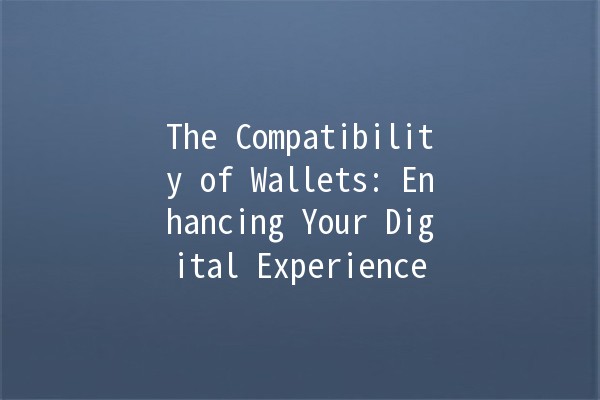




In today's digital age, wallets have evolved from simple leather pouches to sophisticated digital applications that store not just money, but also important personal information and digital assets. However, as the landscape of digital wallets grows, so does the importance of understanding compatibility between different platforms and currencies. Wallet compatibility refers to how well your digital wallet can interact with various types of cryptocurrencies, payment methods, and blockchain technologies. In this article, we'll explore the essential factors of wallet compatibility and provide practical tips on how to maximize your digital wallet's effectiveness.
As the cryptocurrency space expands, the need for users to select wallets that are compatible with their specific needs has become increasingly vital. A compatible wallet can enhance your ability to transact seamlessly, securely, and efficiently. Here are some reasons why wallet compatibility matters:
Not all wallets support the same cryptocurrencies. Choosing a wallet that supports a diverse range of coins and tokens allows you to manage multiple assets without the hassle of switching between different wallets.

A wallet that is compatible with popular cryptocurrency exchanges simplifies the buying, selling, and trading processes. This level of integration can save you time and reduce transaction fees.
Certain wallets offer advanced security features like multisignature support, hardware wallet compatibility, and twofactor authentication. Educating yourself on these features helps you choose a wallet that protects your assets effectively.
Compatibility in terms of user experience is crucial. A wallet that is easy to navigate can lead to smoother transactions and a better overall experience, especially for beginners.
Digital wallets are constantly evolving. Using a wallet with good compatibility ensures that you benefit from the latest updates, features, and customer support.
To ensure your wallet remains compatible and efficient, here are five actionable tips to consider:
When selecting a digital wallet, prioritize researching the types of cryptocurrencies you plan to hold. Look for wallets that explicitly mention support for your preferred coins. For example, if you’re planning to invest in Ethereum and its tokens, you'd want a wallet that supports ERC20 tokens.
Example Use Case:
If you're interested in holding Chainlink (LINK), ensure that the wallet you choose explicitly states its support for this cryptocurrency. This will prevent any issues with transferring funds later on.
Just like any software, digital wallets require regular updates to function optimally. Updates often come with enhanced features, better security measures, and improved compatibility with various blockchains and networks.
Example Use Case:
If your wallet provider releases an update that includes support for new coins, failing to update could mean missing out on new investment opportunities.
Hardware wallets offer a high level of security compared to software wallets. They store your private keys offline, making them less susceptible to hacks. Many hardware wallets are compatible with multiple cryptocurrencies and can connect with software wallets to enhance compatibility.
Example Use Case:
If you use a hardware wallet like Trezor or Ledger, you can manage your Bitcoin offline while pairing it with a software wallet for easier transactions when needed.
Consider using a universal wallet that supports various cryptocurrencies, tokens, and blockchains. Some wallets are built to integrate with different protocols and allow easy asset conversion and management.
Example Use Case:
Wallets like Exodus or Atomic Wallet provide support for a wide range of coins and tokens, enabling users to control their digital asset portfolio in one place.
Join online communities or forums related to your wallet and cryptocurrencies. Engaging with fellow users can provide insights into new compatibility options, updates, and best practices for managing your digital wallet.
Example Use Case:
Participating in a Telegram group dedicated to cryptocurrency discussions can lead you to discover wallet features that you were unaware of, enhancing your overall experience.
Digital wallets come in several forms: software wallets (mobile or desktop), hardware wallets, and paper wallets. Software wallets are userfriendly but may lack security. Hardware wallets provide high security but require initial setup and investment. Paper wallets are secure but not practical for frequent transactions.
Most wallet providers list the cryptocurrencies they support on their websites or within the app. Always check this list before transferring any funds.
Yes, you can transfer cryptocurrencies between wallets. Just ensure that the receiving wallet supports the specific coin you are sending.
If a transaction is not recognized, doublecheck the wallet address and transaction IDs. If everything appears correct and the problem persists, contact customer support for your wallet provider for assistance.
Private key management is crucial. If your wallet is compatible but you lose access to your private key, you risk losing access to your assets permanently. Always back up and protect your private keys.
While connecting your wallet to an exchange is generally safe, ensure that you use reputable exchanges and follow best security practices like using twofactor authentication to protect your assets.
The landscape of digital wallets is continually evolving, and understanding the importance of wallet compatibility is key to managing your digital assets effectively. By following the tips provided and staying informed about ongoing updates and community advice, you can enhance your wallet's effectiveness and enjoy a seamless digital experience. Engaging with the cryptocurrency community and using the right resources will also contribute to a more informed and productive wallet usage. Dive into the world of digital wallets with confidence, and empower yourself to make optimal choices for your financial future!